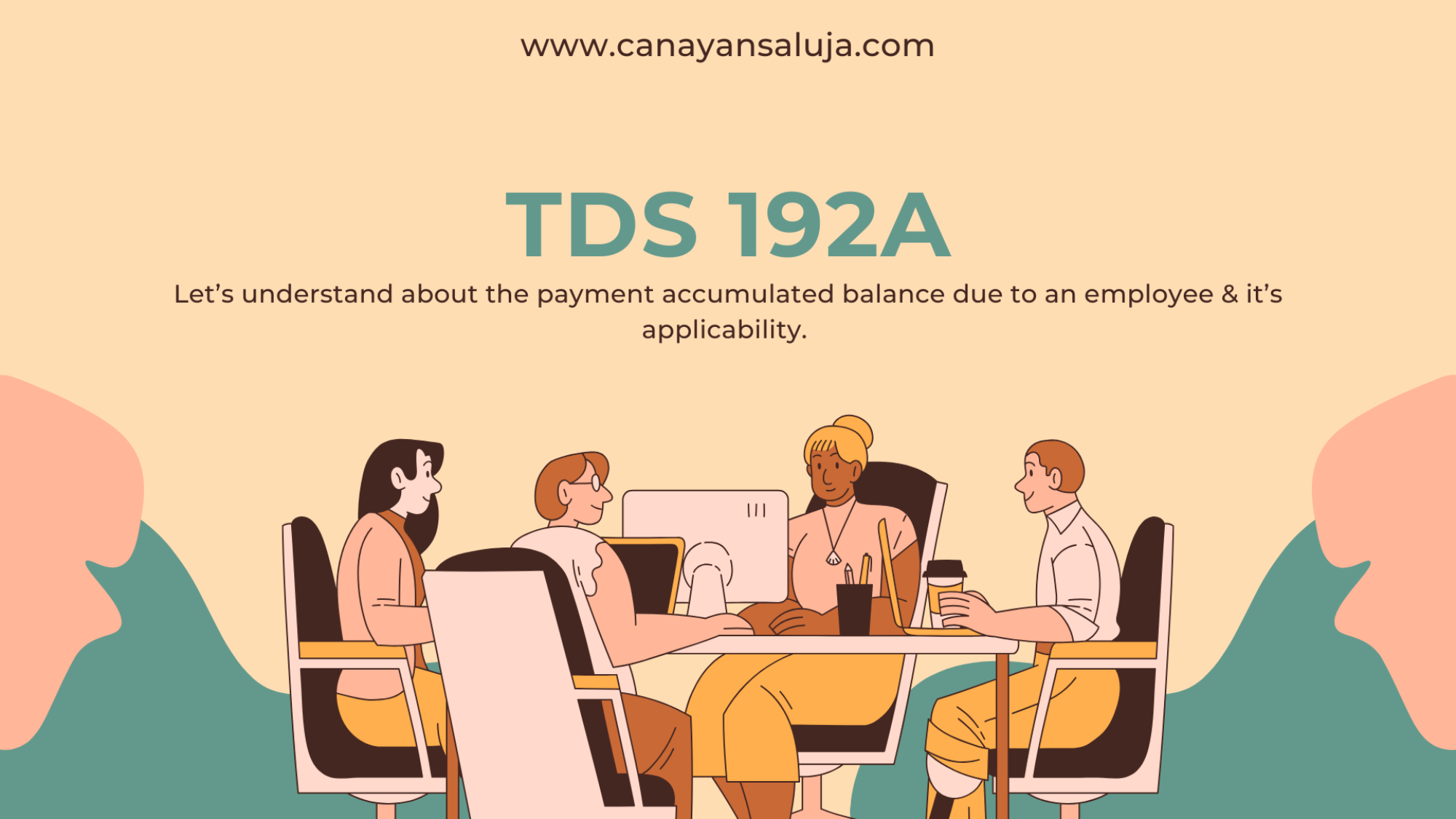- What do you mean by TDS?
TDS stands for Tax Deducted at Source. TDS is a kind of tax that is deducted by the payer before making certain payments like Salary, Rent, Commission, Interest, Royalty, Professional Fees etc. to the payee.
TDS is required to be deducted at the source if the money to be paid and the money already paid exceeds a specified amount.
The Payee can claim this tax deducted by the payer while paying his income tax liability for the year, and if the TDS deducted is more than the income tax liability of the assessee then he/ she will be entitled to a refund.
The main purpose of introduction of TDS was to reduce the Tax evasion by the person receiving the income.
Note: –
Payer- A payer is a person or organization who is responsible for deducting TDS before paying the amount to Payee.
Payee- A Payee is a person or organization who receives the payment from the payee after the TDS deduction.
2. What is TDS under Section 192A of Income Tax Act?
Section 192A of Income Tax Act, 1961 specifies the TDS on early/ premature withdrawal of EPF. The Employee Provident Fund Scheme, 1952 has to deduct TDS before making EPF payments to the employees.
3. What do you mean by EPF?
EPF stand for Employees Provident Fund, it is a retirement benefit scheme that provides financial security for the employees.
Both the employer and employees contribute 12% each of the employee’s basic salary & dearness allowance.
Employee’s can partially withdrawal this amount for specific reasons like higher education, marriage, illness etc.
The interest earned on the EPF is tax free, the current rate of interest rate is 8.15% p.a.
Employees receive a lump sump amount upon retirement, which includes the accrued interest. In the event of death of the employer his/ her dependent/ dependents are entitled to the benefits.
4. When is TDS deducted under Section 192A?
Normally the TDS is to be deducted at the time of payment or at the time of crediting the party in the books of accounts whichever is earlier, but in case of TDS u/s 192 the TDS must be deducted at the time of payment only.
Few examples of date of deduction are: –
| S.no | Date of Payment to employee | Date of crediting the party in books of accounts | Date of TDS deduction |
| 1. | 30/04/2024 | 30/04/2024 | 30/04/2024 |
| 2. | 30/04/2024 | 01/05/2024 | 30/04/2024 |
| 3. | 01/05/2024 | 30/04/2024 | 01/05/2024 |
| 4. | 01/05/2026 | 30/04/2024 | 01/05/2026 |
5. Who is required to deducts TDS under Section 192A?
The Trustee of the Employee’s Provident Fund Scheme 1952, who may be the employer or any other person permitted by the scheme to pay the employee the accrued EPF amount, are required to deduct & deposit TDS.
6. Rate of TDS under Section 192A?
Under Section 192A of the Income Tax Act, 1961, the entrusted entity is required to deduct TDS @ 10% if the amount withdrawn is more than Rs. 50,000. However, if someone fails to prove his/ her PAN, the then TDS rate will be MMR i.e. 34.608% instead of 10%.
Example: –
Mr. Mayank retires from an entity within 5 years of joining and withdrawal his EPF balance of Rs. 2,50,000 then the TDS liability will be 10% of Rs. 2,50,000 i.e. 25,000 which is to be deposited on or before 7th of next month.
7. Exemptions under Section 192A?
The following are the circumstances where TDS under Section 192A will not be deducted while withdrawing TDS.
- The total EPF withdrawal amount is less than Rs. 50,000.
- The EPF withdrawal is made after a continuous period of 5 years.
- When the employee has submitted Form 15G or 15H in addition to his/ her PAN.
- In the event of Job change, where PF is transferred from one account to another.
- In case of termination of employment because of project completion or termination of employment because of discontinuation of employer’s venture.
- In case of termination of employment due to ill health.
8. Time limit for deposit of TDS under Section 192A?
The due date for deposit of TDS is as below: –
| Month | Due Date |
| April | On or before 7th May. |
| May | On or before 7th June. |
| June | On or before 7th July. |
| July | On or before 7th August. |
| August | On or before 7th September. |
| September | On or before 7th October. |
| October | On or before 7th November. |
| November | On or before 7th December. |
| December | On or before 7th January. |
| January | On or before 7th February. |
| February | On or before 7th March. |
| March | On or before 30th April. |
9. What is the due date for filing of TDS return under Section 192A?
TDS is to be deposited monthly on the dates mentioned above but the return is to be filed quarterly on or before the below mentioned dates: –
| Quarter | Period | Due date (TDS filing) |
| 1St quarter | April-June | 31st July. |
| 2nd quarter | July-September | 31st October. |
| 3rd quarter | October- December | 31st January. |
| 4th quarter | January- March | 31st May. |
10. Type of TDS return & form to be issued?
TDS under this section has to filed quarterly through FORM 26Q and the deductor has to issue FORM 16A to the employee after filing of return.
11. Fees/ Penalties for Late/ Non- Filing of TDS u/s 192A?
Following penalties/fees will be levied if there is delay in TDS deduction or delay in deposit of TDS or non-filing of quarterly return.
| Particulars | Penalty |
| TDS not deducted on time. | 1% per month or part of month. |
| TDS deducted but not deposited before due date | 1.5% per month or part of month. |
| TDS return not file on or before due date | 200 per day maximum till TDS amount. |



Add a Comment